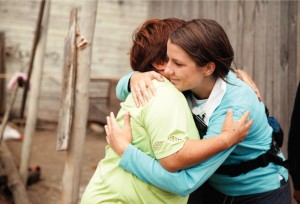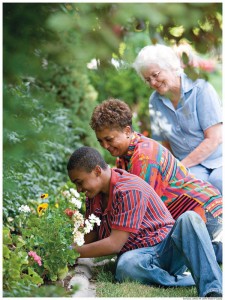We all want to return to live with Christ and our Father in Heaven, but to do so requires that we undergo spiritual development so we fit in when we get there. Growing and maturing in spiritual things can be a very confusing process. In one sermon we hear about how important service is. In another sermon we are told we cannot be saved in ignorance and that we have to know the doctrine. Well, for heaven’s sake, will someone please make up their mind? Which is it?
Spiritual development is like two sides of a coin. Both service and doctrine are important, and neither one is sufficient by itself to return us to live with God. This three-part series will cover the two sides of the spiritual development coin and then discuss how to work on balancing each side so we don’t get lopsided in our lives. This is only an introduction to the topic, not an in-depth treatment on service and doctrine in the Lord’s restored Church.
What is Pure Religion?
 When we are introduced to the gospel of Christ, we are only introduced to parts of it at a time. It takes years to learn your way around and to navigate all that is required of a faithful follower of Christ. What attracts most people to Christianity are the aspects of service, kindness, and caring for one another. These are all part of pure religion.
When we are introduced to the gospel of Christ, we are only introduced to parts of it at a time. It takes years to learn your way around and to navigate all that is required of a faithful follower of Christ. What attracts most people to Christianity are the aspects of service, kindness, and caring for one another. These are all part of pure religion.
In the New Testament, in James 1:27, James says:
Pure religion and undefiled before God and the Father is this, To visit the fatherless and widows in their affliction, and to keep himself unspotted from the world.
This is a description of religion stripped down to its barest essentials. The Lord wants us to care for the orphans and the widows, and keep ourselves clean from the sins of the world. In other words, we are commissioned to care for and protect those who cannot care for and protect themselves. Notably in this verse is the injunction to visit the fatherless and widows in their affliction.
Of course there are more things we can do to practice this pure religion aspect of the gospel. Any kind of service to another person would qualify. So let’s look at the things we are asked to do in the Church that fulfill this part of the spiritual maturing process.
All forms of service are a fulfillment of the second of the two great commandments:
“And thou shalt the Lord thy God with all thy , and with all thy soul, and with all thy mind, and with all thy : this is the first commandment” (Mark 12:30). “The second is like unto it, Thou shalt love thy neighbor as thyself” (Matthew 22:39).
The Church of Jesus Christ of Latter-day Saints is a church of assignments. We don’t ask for volunteers to fill the needs of others. The volunteering was done at the point of baptism when we made a covenant with God to mourn with those that mourn and comfort those who stand in need of comfort. It is assumed that we are all willing to help and serve each other. So to that end, we are assigned anywhere from one to four families or individuals to visit each month.
Ministering to Others
 Ministering sisters visit only the woman of the house. They are there to assist, support, assess needs, and supply encouragement. If you have been a member of the Church for any length of time, you probably have a list of examples of both good and not so good sets of ministering sisters. The same goes for the ministering brothers, who focus on the needs of the whole family.
Ministering sisters visit only the woman of the house. They are there to assist, support, assess needs, and supply encouragement. If you have been a member of the Church for any length of time, you probably have a list of examples of both good and not so good sets of ministering sisters. The same goes for the ministering brothers, who focus on the needs of the whole family.
As a church full of imperfect people, we are working to learn how to do as Christ would do. We look for needs and try to help where we can. Sometimes we fall down on the job, but once in a while we manage to shine.
Callings
We are a lay clergy, so no one is paid to play the organ, preach a sermon, teach a class, or run an organization. All the work on the ward (congregation) level and stake (a collection of wards) is done by callings. We don’t call ourselves; the bishop of each ward extends the request for service and we accept the invitation, then do our best to serve faithfully in that calling until such time as we are released and asked to do something else.
Some callings only last a few weeks, while others last for years. I taught a Sunday School class for more than a decade, and have played the organ or piano for my ward for more than 50 years now. I have also played the piano at baptisms, for priesthood meetings, for the ward choir, and countless other places where someone of only moderate talent could help out in a pinch. By accepting whatever calling we are given, we learn to teach, lead, and support others in their callings. In one calling we may be the leader, then in the next we may be tending the nursery children. One never knows where service will be needed.
Service Projects
 As a collection of members in a geographical area, our wards are full of opportunities to help one another. There is always someone who is giving birth or dying, having surgery or moving, cleaning their yard or needing their roof repaired. There are always people who are sick, handicapped, or have some other social or mental challenge. The list is endless. And we don’t just help our fellow members; we help those not of our faith as well. Our members help families move, repair roofs, and help new mothers, elderly widows, and the sick or infirm. We watch each others’ children and do whatever needs to be done.
As a collection of members in a geographical area, our wards are full of opportunities to help one another. There is always someone who is giving birth or dying, having surgery or moving, cleaning their yard or needing their roof repaired. There are always people who are sick, handicapped, or have some other social or mental challenge. The list is endless. And we don’t just help our fellow members; we help those not of our faith as well. Our members help families move, repair roofs, and help new mothers, elderly widows, and the sick or infirm. We watch each others’ children and do whatever needs to be done.
Family Service
The most important place to learn to serve is in the home. Teaching service originates in the home. If you think it is hard to serve someone you don’t know, try serving someone who argues with you every day. The family is the place where we learn to love those whose weaknesses we know almost as well as our own. It is the parents’ responsibility to teach children to serve each other, and to find joy in that service. That means the parents serve each other as well, to set the example for their children.
Children also need to learn to serve their parents. The Church’s role in the family is to be a support structure for what the parents are teaching in the home. It is not the Church’s place to take over teaching the children; the Church only gives the children a place to practice and learn more about what Dad and Mom are teaching them in the home.
Conclusion

To read more of Kelly’s articles, click here.
This overview of service in the Church is not exhaustive, but just serves to show that there is no shortage of ways to learn to love our neighbor. The whole Church organization is set up to facilitate serving one another. If you have ever seen the yellow “Helping Hands” jackets worn by members of the Church during public service projects, this should explain why The Church of Jesus Christ of Latter-day Saints is so good at organizing and carrying out such projects. It is literally what we do all the time.
Some people are suspicious about why the Latter-day Saint community is so tightly knit, and this is why. We spend a lot of time serving each other. We also have ingrained in us to be as self-reliant as possible. This makes it difficult for many of us to receive service from others. That is an odd sort of twist, isn’t it? We are so accustomed to giving that we are uncomfortable being on the receiving end of it. I guess this just goes to show that there is always more to learn in our quest for spiritual development.
About Kelly P. Merrill
Kelly Merrill is semi retired and writes for https://gospelstudy.us. He lives with his wife in Idaho. His strength is being able to take difficult to understand subjects and break them down into understandable parts. He delights in writing about the gospel of Christ. Writing about the gospel is his personal missionary work to the members of the Church and to those of other faiths who are wanting to know more about Christ's gospel and His Church.






